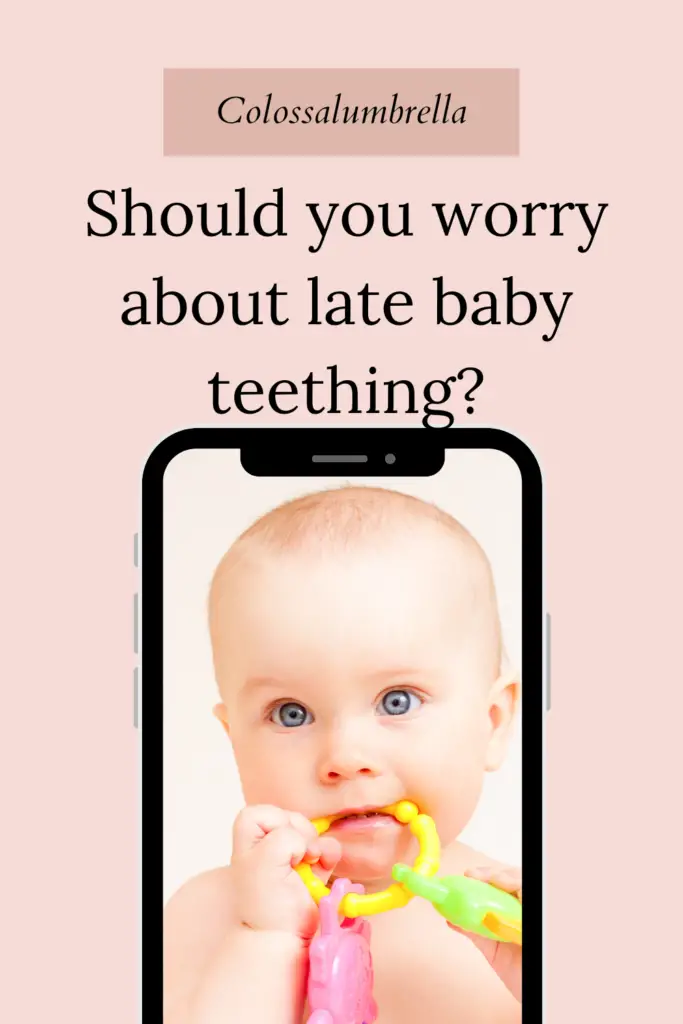Contents
Baby teeth, also known as primary teeth or deciduous teeth, are an important milestone in a child’s development. They play a crucial role in chewing, speaking, and even shaping the jaw for the permanent teeth that will come later. As a parent, it’s natural to wonder when your baby’s teeth will start to appear. While the average age for the eruption of baby teeth is between 6 to 12 months, every child is unique, and the timing can vary.
This blog post explore when to worry about baby teeth not coming in, the causes of delayed tooth eruption, potential risks, and treatment options available. I will also address confusing question if late teething sign of intelligence and some frequently asked questions to provide you with all the information you need to navigate this important stage of your child’s dental development.
Subscribe to my blog for Parenting tips that will make you feel like a pro, and get access to exclusive free Printables that will keep your little ones busy and happy!
Timeline for Baby Teeth Eruption
The eruption of baby teeth follows a general timeline, but it’s important to remember that variations are common. Most babies will start to grow their first teeth, usually the lower central incisors, around six months of age. The eruption of teeth continues gradually, and by the age of three, most children will have a complete set of 20 primary teeth.
However, it’s essential to note that the timing of tooth eruption can vary significantly among children. Some babies may experience early eruption, with teeth appearing as early as four months old, while others may have a delayed eruption, with teeth not appearing until closer to 12 months. This range is considered normal and does not necessarily indicate any underlying issues.
When to worry about baby teeth not coming in?
While delayed tooth eruption is usually not a cause for concern, there are certain situations where it may be necessary to seek professional dental advice. It is generally recommended to consult a pediatric dentist if your baby has no teeth by 12 months of age. Additionally, if your child’s teeth have not erupted by the time they are four years old, it is advisable to seek dental evaluation.
It’s important to remember that every child is different, and delayed tooth eruption alone does not necessarily indicate a problem. However, consulting a dentist can help identify any underlying issues and provide appropriate guidance and treatment if needed.
For more clarity here are benefits of late teething.
Causes of Delayed Tooth Eruption
Delayed tooth eruption can have various causes, ranging from genetic factors to developmental disorders. Here are some common factors that can contribute to delayed tooth eruption:
- Genetic Factors – Genetics can play a role in the timing of tooth eruption. If you or your spouse had a delayed tooth eruption, there is a possibility that your child may experience a similar delay. It’s always helpful to inquire about the timing of tooth eruption in your family members to gauge any potential genetic influence.
- Premature Birth or Low Birth Weight – Babies who are born prematurely or have a low birth weight may experience delays in tooth eruption. Premature birth and low birth weight can affect the overall development of a child, including the timing of tooth eruption. If your baby was born prematurely or had a low birth weight, their developmental age may be closer to their actual age.
- Nutritional Deficiencies – Proper nutrition is essential for healthy tooth development. Nutritional deficiencies, particularly deficiencies in vitamins such as Vitamin D, can contribute to delayed tooth eruption. It’s crucial to ensure that your child receives a balanced diet with adequate nutrients to support their overall growth and dental development.
- Developmental Disorders – Certain developmental disorders can be associated with delayed tooth eruption. Conditions such as Down syndrome, hypopituitarism, and regional Odontodysplasia may affect the timing of tooth eruption. If your child has been diagnosed with a developmental disorder, it’s important to consult with a pediatric dentist for appropriate guidance.

Risks Associated with Delayed Tooth Eruption
In most cases, delayed tooth eruption does not pose significant risks to a child’s overall health or permanent teeth. However, there are some potential risks to consider:
Increased Risk of Tooth Decay
Children who experience delayed tooth eruption may be at a higher risk of developing tooth decay. The delay in tooth eruption can lead to prolonged exposure of the gums to bacteria, which can increase the likelihood of cavities. It’s crucial to practice good oral hygiene and schedule regular dental visits to monitor and maintain your child’s oral health.
Potential Need for Orthodontic Treatment
Children with delayed tooth eruption may have a higher likelihood of needing orthodontic treatment later in childhood or adolescence. The delayed eruption can affect the alignment and spacing of the permanent teeth. Regular dental check-ups can help identify any orthodontic issues early on and allow for timely intervention if necessary.
Treatment for Delayed Tooth Eruption
In most cases, delayed tooth eruption does not require specific treatment unless it is caused by malnutrition. However, it’s essential to monitor the situation and consult with a pediatric dentist for appropriate guidance. The dentist may recommend a nutritionist’s consultation to ensure that your child’s diet is well-rounded and supports their dental and overall development.
Delayed tooth eruption, also known as delayed teething, can occur for various reasons, and treatment options depend on the underlying cause. If you’re concerned about delayed tooth eruption in a child, it’s essential to consult with a pediatric dentist or a dental specialist for a proper evaluation and guidance. Here are some potential causes and treatments for delayed tooth eruption:
- Genetics: Sometimes, delayed tooth eruption may simply be a genetic trait, with teeth coming in later than average. In such cases, there may not be any specific treatment needed, as the teeth will eventually erupt on their own.
- Nutritional factors: Ensure that the child is receiving a well-balanced diet with adequate vitamins and minerals, especially calcium and vitamin D, which are essential for healthy tooth development. A pediatric dentist or doctor may recommend dietary adjustments or supplements if necessary.
- Hormonal imbalances: Hormonal issues can affect tooth eruption. In some cases, hormone therapy or medical intervention may be necessary, and this should be discussed with a healthcare provider or specialist.
- Syndromes or medical conditions: Certain medical conditions or syndromes can lead to delayed tooth eruption. Treatment may involve addressing the underlying condition in collaboration with a pediatric dentist and other medical specialists.
- Space maintenance: In some cases, if a primary (baby) tooth is lost early due to trauma or decay, a dentist may need to place a space maintainer to prevent adjacent teeth from shifting into the space, which could interfere with the eruption of permanent teeth.
- Orthodontic treatment: If delayed tooth eruption affects the alignment of permanent teeth or causes crowding issues, orthodontic treatment may be necessary. Orthodontic evaluation and potential treatment options should be discussed with an orthodontist.
- Monitoring and patience: Sometimes, delayed tooth eruption may resolve on its own with time. Regular dental check-ups and monitoring by a pediatric dentist are essential to track tooth development and determine if any treatment is necessary.
Is late teething sign of intelligence?
There is no scientific evidence to suggest that late teething is a sign of intelligence. Teething is a natural and variable process, and the timing of when a child’s teeth come in can vary widely from one individual to another. Some children may start teething earlier, while others may start later.
Intelligence is a complex trait influenced by a combination of genetic, environmental, and developmental factors. Teething, on the other hand, is primarily related to the growth and development of a child’s teeth and gums.
It’s important not to make assumptions about a child’s intelligence based on factors like the timing of teething. Intelligence is multifaceted and cannot be determined by a single physical characteristic or developmental milestone. Instead, it’s better to focus on providing a supportive and stimulating environment for a child’s overall development, including cognitive, social, and emotional growth.
Conclusion
The eruption of baby teeth is an exciting milestone in your child’s development. While the timing of tooth eruption can vary among children, delayed tooth eruption is typically not a cause for significant concern. However, it’s important to consult with a pediatric dentist if your baby has no teeth by 12 months or if there are other accompanying dental or developmental issues.
Remember to practice good oral hygiene, provide a balanced diet, and schedule regular dental visits to ensure your child’s oral health and overall well-being. By staying informed and seeking professional guidance when necessary, you can navigate the journey of your child’s dental development with confidence and peace of mind.
Disclaimer: The content of this blog is for informational purposes only and is not intended to be a substitute for professional medical advice, diagnosis, or treatment. Always seek the advice of your physician or other qualified healthcare providers with any questions you may have regarding a medical condition.
Disclaimer – This website has affiliate links. I may earn a commission if you purchase through affiliate links. However, the product recommendations are based on my genuine opinions.
I would stay connected and keep you updated with parenting tips, pregnancy guides, creative ideas, easy crafts, and Free Printables. Subscribe to Colossalumbrella to get new ideas delivered to your inbox. Follow me on Facebook, Pinterest, Twitter, and Instagram.
